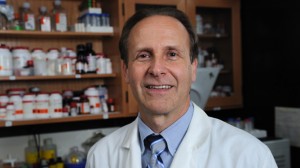OXFORD, Miss. – Scientists at the University of Mississippi are receiving national recognition for their research on the immune-enhancing effects of echinacea.
David S. Pasco, assistant director of UM’s National Center for Natural Products Research, presented a poster on this research in December at the National Institutes of Health.
The presentation was in conjunction with the Stephen E. Straus Distinguished Lecture in the Science of Complementary Health Therapies, presented by the National Center for Complementary Medicine and Alternative Medicine, or NCCAM. The series brings leading figures in science and medicine to the NIH to speak about their perspective on the field of complementary health therapies.
Pasco’s presentation outlined his NIH-funded research on “Immune Enhancing Echinacea Bacterial Endophytes” (1R01AT007042). Co-investigators on the project include Nirmal Pugh, NCNPR senior scientist; Rita Moraes, NCNPR research associate professor; and Colin Jackson, professor of biology.
Conducted over the last 12 years, their research reveals that the main immune-enhancing components of echinacea are not from the plant itself.
“Some plants have a lot of bacteria that normally live inside them in a symbiotic relationship,” Pasco said. “These are called endophytes. Our contribution to the field for immune stimulatory aspects of plants is that the main source of this immune stimulation is coming from the bacteria, and not the plant itself. This completely changed the way people look at that field.”
The research shed light on how these bacteria can improve the immune system.
“Oral ingestion of these bacteria can influence infection in mice,” Pasco said. “We did a study with mice which shows that if they ingest bacterial components for a month, and then you expose them to the H1N1 (or swine flu) virus, pathology is greatly reduced.”
Immune system health is more important than many people think, Pasco said.
“Your immune system influences so many aspects of your body that people really don’t realize it,” he said. “Without the proper inputs for optimum immunity, not only does your immune system suffer, but the rest of your body does as well. Joint health, skin and muscle tone are all influenced by the immune system. The innate immune system is responsible for all kinds of repair in your body. So if that gets weak, then you don’t repair the way you are supposed to.”
Pasco was one of six poster presenters at the NIH lecture. All were selected from various institutions funded by NCCAM, such as Emory University and the Harvard Medical School, in addition to UM.
“It’s so fulfilling to see that your work is recognized amongst the work of other respected researchers,” Pasco said. “It also emphasizes another example of our School of Pharmacy’s truly cutting-edge research.”
“Over the past 10 years, Dr. Pasco and Dr. Pugh have really opened up a new area of research for botanicals and immune stimulation,” said Larry Walker, NCNPR director. “This work appears to hold fundamental promise in helping our understanding of the role of diet and immunity, and is applicable far beyond the findings with echinacea.”
